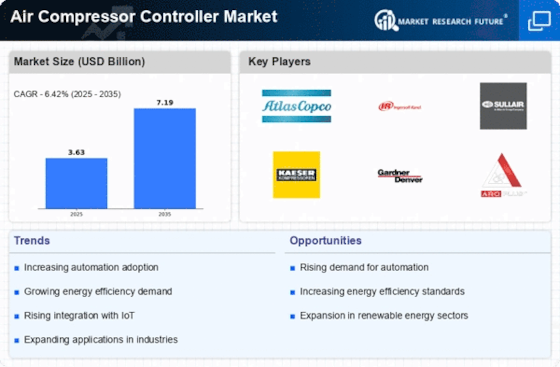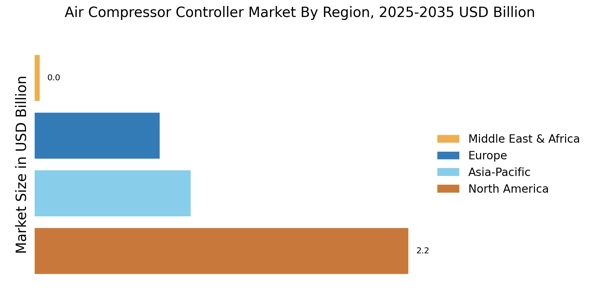Emphasis on Energy Efficiency
The emphasis on energy efficiency within the Air Compressor Controller Market is becoming increasingly pronounced. As energy costs continue to rise, industries are seeking solutions that minimize energy consumption while maintaining performance. Air compressor controllers equipped with energy-saving features can significantly reduce operational costs. Recent studies suggest that energy-efficient air compressor systems can lower energy usage by up to 30%, which is a compelling incentive for manufacturers to invest in these technologies. Additionally, regulatory frameworks are evolving to promote energy efficiency, further driving the adoption of advanced air compressor controllers. This focus on sustainability not only benefits the environment but also enhances the competitive edge of companies that prioritize energy-efficient solutions.
Rising Adoption of IoT Solutions
The rising adoption of IoT solutions is reshaping the Air Compressor Controller Market. IoT-enabled air compressor controllers facilitate remote monitoring and management, allowing operators to track performance metrics and receive alerts for maintenance needs. This connectivity enhances operational efficiency and reduces downtime, which is crucial for industries that rely heavily on compressed air systems. Market analysis indicates that the integration of IoT technologies in air compressor systems could lead to a reduction in maintenance costs by up to 20%. As industries increasingly recognize the benefits of IoT, the demand for smart air compressor controllers is expected to surge, driving innovation and competition within the market.
Integration of Advanced Automation
The integration of advanced automation technologies in the Air Compressor Controller Market is driving significant growth. Automation enhances operational efficiency, reduces human error, and optimizes performance. As industries increasingly adopt automated systems, the demand for sophisticated air compressor controllers rises. According to recent data, the market for automated air compressor systems is projected to grow at a compound annual growth rate of approximately 6.5% over the next five years. This trend indicates a shift towards more intelligent systems that can adapt to varying operational demands, thereby improving productivity and reducing downtime. Furthermore, the incorporation of machine learning algorithms allows for predictive maintenance, which can lead to substantial cost savings and increased reliability in air compressor operations.
Growing Demand from Manufacturing Sector
The growing demand from the manufacturing sector is a key driver in the Air Compressor Controller Market. As manufacturing processes become more complex, the need for reliable and efficient air compressor systems increases. Industries such as automotive, aerospace, and food processing are particularly reliant on compressed air systems for various applications. Data indicates that the manufacturing sector accounts for a substantial portion of air compressor usage, with projections estimating a growth rate of around 5% in the coming years. This demand is fueled by the need for enhanced productivity and the adoption of advanced manufacturing technologies. Consequently, manufacturers are investing in high-performance air compressor controllers to meet these evolving requirements.
Technological Advancements in Controller Design
Technological advancements in controller design are significantly influencing the Air Compressor Controller Market. Innovations such as digital controllers, variable speed drives, and smart sensors are enhancing the functionality and efficiency of air compressor systems. These advancements allow for better monitoring and control of air compressor operations, leading to improved performance and reduced energy consumption. The market for smart air compressor controllers is expected to witness a notable increase, with estimates suggesting a growth rate of approximately 7% annually. This trend reflects the industry's shift towards more sophisticated solutions that can provide real-time data and analytics, enabling operators to make informed decisions and optimize their systems effectively.

















